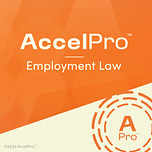Welcome to AccelPro Employment Law, where we provide expert interviews and coaching to accelerate your professional development. Today, we are featuring a discussion with Stacey McClurkin Macklin.
It’s common for the National Labor Relations Board (NLRB) to change its approach when a new presidential administration takes office, especially when the new administration also represents a change of political parties.
But the degree of change in the last few years has surprised experts in the employment law space. Add that to an ever-changing work environment, and it’s never been more important for employers, human resources executives and employment attorneys to be on top of unfair labor practice issues.
Our guest to steer us through these tumultuous waters is Stacey McClurkin Macklin. Today, she’s an attorney at Stinson, where she advises companies on a wide range of employment law issues. Before joining Stinson, she spent eight years with the NLRB, where she investigated unfair labor practice charges, educated employers on labor law and had a police escort away from a union vote.
Macklin offers best-practices advice about how to avoid NLRB investigations, how to handle them when they come up and how to deal with the NLRB’s newfound aggressive policies. The supplemental materials and episode transcript are available below.
AccelPro’s expert interviews and coaching accelerate your professional development. Join AccelPro Employment Law now for a free trial of everything we offer to members.
Interview References
Stacey McClurkin Macklin’s Stinson profile
12:20 | McClurkin Macklin, Stacey. (February 17, 2023). How Employers Can Balance Labor's Surge With NLRB's Restrictions. Bloomberg Law.
18:51 | Michigan Law. (2022). Curtis L. Mack.
TRANSCRIPT
I. HOW TO ENFORCE POLICIES CONSISTENTLY
Matt Crossman, Host: Let’s start with some background. You left the NLRB to work for Stinson. What did you do at the NLRB?
Stacey McClurkin Macklin: I had an eight-year career at the National Labor Relations Board as an attorney advisor. I was in the Baltimore office. We wear different hats in that position.
The first thing that happens is you’re an investigator. You get unfair labor practice charges that are brought either against an employer or a union. What I would do in that position is actually conduct the entire investigation from start to finish. I’d speak with the charging parties, I’d get their witness statements, I’d collect evidence, and I’d find any other witnesses I may need to speak to.
Then I would reach out to the charge party, which would be an employer or a union, and I’d let them know, this is the information that I need, whether it’s talking to their potential witnesses or getting a position statement from them or documents that I think could be helpful in the investigation.
And ultimately, after I have all of that information, I would make a recommendation to the regional director on whether or not there’s enough evidence to say a violation has or has not occurred.
So that’s one role. I would also help facilitate negotiating settlement agreements and ultimately, if there was no settlement agreement, we would litigate that case against a charge party.
MC: If there’s one thing you could tell every human resources executive and employment attorney that you learned at the NLRB that would help them do their jobs better, what would it be?
Listen to this episode with a 7-day free trial
Subscribe to AccelPro | Employment & Labor Law to listen to this post and get 7 days of free access to the full post archives.












